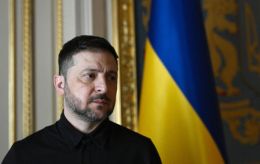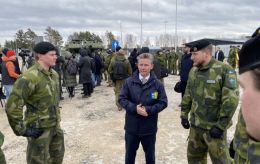Volodymyr Zelenskyy confident Ukraine's partners will not betray country
 Volodymyr Zelenskyy, President of Ukraine (photo: Getty Images)
Volodymyr Zelenskyy, President of Ukraine (photo: Getty Images)
President Volodymyr Zelenskyy is convinced that the most important thing is to conclude a peace agreement that will unite the nation, not divide it. He does not believe in betrayal by Western partners and considers such a scenario practically nonexistent, according to his interview for Time magazine.
The president was asked how he envisions himself and his role in the post-war period if a peace agreement is reached. He stated that for him, the most important thing is an agreement that will unite, not divide, the nation - an agreement for a just peace.
According to the president, after the war, the country would face several challenges, including a demographic crisis, the issue of reconstruction, infrastructure, and the needs of veterans. However, in his view, the agreement must unite the nation because, in that case, the nation will be able to address the next issue - how to recover in a just manner.
"I think we will see a surge in morale. The need to rebuild will not be a problem, but the opposite. We will know that we have saved the country, saved our independence, and now we can build it all back. And that will be a really big source of positivity. We will have found the social contract on where things stand and how the war ended. Then, when it comes to the demographic question, if we have this positive moment to motivate us, then people will return," said the head of state.
In Zelensky's view, if the post-war period is not gray but bright, we will see that we are rising. He expects an influx of investment into Ukraine, regardless of whether he remains president or steps down.
The president believes that when the people feel this rise, the people become more important than any role played by politicians, as the people are the ones who can bring us back to life.
"In those circumstances, leadership is more like management, rather than in the difficult times, when the nation needs a leader. But if the next phase will be a forced peace, a humiliating one, if Ukraine, God forbid, will be left on her own, and if our partners, for whatever reason, will not be partners to us, then Ukraine will fall into a depression. She will have fought for everyone and ended up alone," Zelenskyy stated.
However, the head of state does not believe in such a development, as it would be a betrayal by our partners and considers the chances of such a scenario practically nonexistent.
"Because then we would need to admit the loss of NATO, the EU, Europe, above all America and all of its current leaders. All leaders are different, but they have their own ambitions. They see their role in history. Many of them are no longer young. They want to enter history as leaders who had success. That’s why I don’t believe in these apocalyptic scenarios. Honestly, I don’t," Zelenskyy concluded.
Negotiations on ending the war
On March 23 and 24, negotiations took place in Riyadh (Saudi Arabia) between the delegations of the US, Ukraine, and Russia regarding the parameters of a 30-day ceasefire.
As a result of the talks, the parties agreed to halt all attacks in the Black Sea and the use of commercial vessels for military purposes. They also agreed to cease strikes on the energy infrastructure of both Ukraine and Russia. The parties decided to involve third countries to monitor the implementation of these agreements.
The United States supported further discussions on the exchange of prisoners of war, the release of civilians, and the return of children deported by Russia from occupied Ukrainian territories.
At the same time, the Kremlin released its version of the outcomes of the negotiations. According to it, the US allegedly promised to assist in the restoration of Russian agricultural exports and fertilizers, as well as the lifting of sanctions on companies involved in the production and export of such goods.
Moscow also listed Ukrainian energy infrastructure objects it promised not to attack. However, Ukraine and the United States did not confirm this information.
In its final statement, the US outlined the results of the agreements, which were close to those presented by Ukraine. However, it omitted points regarding the lifting of Russia's restrictions on the ceasefire regime in the Black Sea.
President Volodymyr Zelenskyy expressed skepticism about Russia's ability to honor the ceasefire conditions in practice and accused the Russian side of prolonging the war.
The administration of Donald Trump hopes to finalize a peace agreement between Ukraine and Russia by April 20 but does not rule out that the signing of the document could be delayed.

